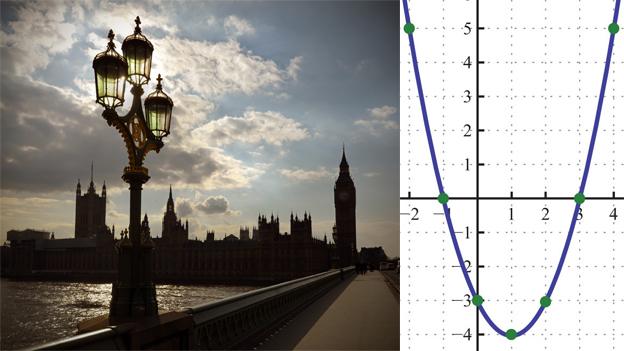The Election Vocabularist: Did the word parliament come from parabola?
- Published

Behind the curve? Why is 'parliament' like a parabola?
This is the day on which Britons vote for candidates seeking to become MPs. What is the history behind these words?
The word vote derives from the Latin votum, as is "vow" (which is what it means) and it is close kin to words denoting a religious dedication, such as votive and votary.
Until the 17th Century it was far better known in Scotland than in England, and it was in Scotland in the 16th Century that (sometimes spelt voit) it began to mean an expression of wish when a decision is taken or an appointment made.
A Scottish Act of 1585, external provided that in county parliamentary elections "nane to have voit bot sik as hes fourtie shilling land in free-tennendry halden of the King".
At that time the word "voice" was common in England to mean a vote. Shakespeare's Coriolanus has a wearyingly long scene, external in which the Bard, in characteristic mob-deriding mood, examines whether the hero will get enough "voices" to become consul. "He has done nobly, and cannot go without any honest man's voice," one supporter cries. There is no hint that "votes" might be used instead.
Whether James VI told the English to start using "vote" when he took over as their king in 1603 is not known. Yet in the 17th Century English political writers such as Thomas Hobbes, external were happily using it as we do today.
Candidate in Latin is candidatus - which means "whitened" or "brightened".
One of its earliest uses in English is in Shakespeare's Titus Andronicus,, external whose hero is offered a white robe and told "Be candidatus then and put it on, And help to set a head on headless Rome".
It comes from candidus meaning shining white, descended from an old word which gives us terms linked to purity and honesty, including candid and candour - and also to glowing and shining, like incandescent, and even burning, like incendiary, incense and candle.
Candidates wore togas which were coloured bright white, according to Isidore of Seville,, external a bishop writing in the 7th Century.

Did James VI bring the word "vote" with him to England?
That is very late to describe a practice in classical Rome - but there are also hints in the writings of the satirist Persius,, external and in the name given to a speech made by Cicero when he was running for consul in 64BC - "Oratio in toga candida" or "Speech in a white toga". , external
Whitening togas is linked by Isidore and Persius with the practice of "ambitio" - literally "walking about" seeking support. We would call it canvassing. The practice was often frowned on in Rome as was "ambition" in English.
Isidore said "creta" was added to the toga, normally a natural woollen colour, to make it stand out, and this is usually taken to mean chalk. But it can also mean white clay, and perhaps the "pipeclay" which could be made into a paste, and was once used to whiten British soldiers' belts, is more likely.
Parliament is a word whose recent history is pretty straightforward, but whose early connections are quite surprising.
Obviously it comes from the word for "talk" in late Latin, related to the French parlez-vous. From the early Middle Ages the idea of a ruler holding a "parlement" or "parlamentum" - a discussion - shaded into the idea of the discussion meeting itself.
Trace it further back, and you discover that words starting with parl- are linked to the Spanish palabra, and our own "palaver" - which is thought to have been copied by English sailors from the Portuguese.
Further back we come to parable, meaning a saying - in English, more particularly, a story in the Bible with a second, moral meaning,. That gives a clue to its Greek original, which is parabola.
Now a parabola in English is a rather pleasing symmetrical curve, but originally in Greek it meant putting two things side by side - from para, as in "parallel", and ballo, meaning "throw" (think of "ballistic").
From there it meant a "comparison" and so a saying or proverb.

The Vocabularist

Subscribe to the BBC News Magazine's email newsletter to get articles sent to your inbox.